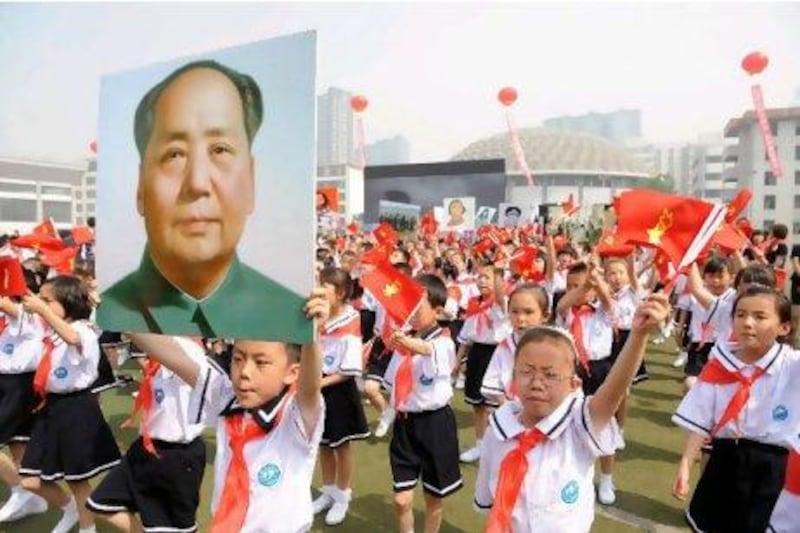BEIJING // As diners eat at the Double Tree restaurant in eastern Beijing looking down upon them from a wall are images of the former leader Mao Zedong.
On one poster, the beaming former chairman of the Communist Party of China is seen above a reverential crowd of people. In another he stands staring into the distance, surrounded by a halo of sunlight.
Cui Yong, 42, the owner of the restaurant, describes Mao as "great".
"He ended the war with the Japanese and succeeded in the liberation. Mao's thought spread across the whole of China," he said.
"In my opinion, Chairman Mao is the idol of China, in the same way that some of the young people have a singer or a movie star as their idol."
Mao remains the central figure in the history of the Communist Party of China, and he features heavily in a major film released today as part of celebrations to mark the 90th anniversary of the founding of the party.
The Beginning of the Great Revival, which is expected to rake in hundreds of millions of yuan at the box office, looks at the decade between the ending of China's last imperial dynasty in 1911 and the Communist Party's creation in 1921.
The film has an all-star cast, and Hollywood blockbusters such as Transformers 3 have seen their release dates pushed back in China so they do not steal cinemagoers from the local film.
A total of 28 films, some looking at the development of China's space or defence programmes, have been produced to mark the 90th anniversary, which falls on July 1.
The Beginning of the Great Revival is the follow-up to another anniversary film, The Founding of a Republic, released in 2009 to mark 60 years since the communist takeover of China.
Even before its release, the new film has sparked controversy. One of its female stars, Tang Wei, had her scenes as an early girlfriend of Mao cut, a move thought to stem from her having appeared naked in a recent film.
According to reports, in the United States there has been anxiety that Shanghai GM, a Chinese arm of the car manufacturer General Motors, is sponsoring what is seen as propaganda film.
For all the mistakes Mao is acknowledged to have made, such as beginning the cultural revolution in 1966, he remains a legendary figure in China, said Chung Chienpeng, an associate professor of political science at Lingnan University in Hong Kong.
"A lot of his economic policies were disasters, but he's very much revered today," he said. "After the Opium War with the British, China fell into a semi-colonial country, divided and invaded by foreigners, and somehow Mao managed to unite the country, destroying the warlords and kicking out the foreigners and imperialists, whatever you call them, and setting up his own regime.
"He's given credit for ending the disorder or chaos and he put things together again and made China respected by a lot of foreigners, and made the Chinese people feel proud of their country again.
"It's for these contributions that he's remembered, not for his policies, which were disasters."
The 90th anniversary celebrations, Mr Chung said, were likely to give little coverage to Mao's mistakes or the famines that happened under his watch.
Many in China appear willing to worship the former leader. Xie Baolan, a 78-year-old retiree, happily sang a song praising Mao before saying that today's leaders did not compare to the senior Communist Party figures of old.
"There are a lot of songs to sing for Mao Zedong," she said. "He gave us great happiness."
Her friend, Wang Shouzhen, 77, is equally pleased to praise Mao as she sits in one of Beijing's remaining hutongs, the alleys in between traditional courtyard houses.
"During the Mao period it was very hard to find bad news about the country's leaders," she said. "Nowadays it's very common to hear about some leaders in the provinces or cities who have been gambling or have bad business activities. Nowadays it is a bad situation."






